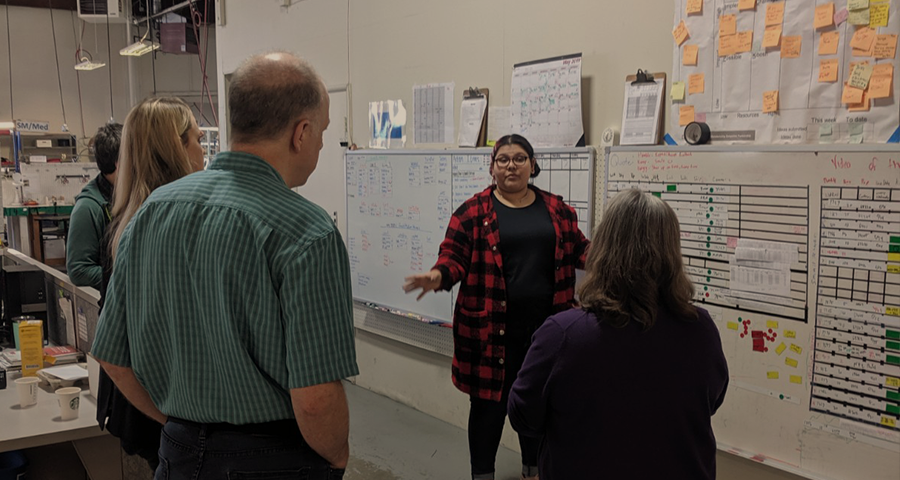Having difficulty finding and retaining staff? You’re not alone. Manufacturing companies increasingly cite talent acquisition and retention as top concerns. While many of them pay higher-than-average wages ($20 to $23 an hour in some cases), the low level of unemployment and lack of qualified applicants expressing interest in these types of careers has impacted the workforce.
In an effort to provide local manufacturers with the opportunity to learn some best practices from their peers in the industry, OMEP partnered with Schwabe, Williamson & Wyatt and Aldrich Advisors to host a Manufacturing Symposium earlier this fall. The lead panel focused on this exact issue. Panelists included: Lori Olund Luchak (President, Miles Fiberglass), Kirsten Dennis (Director of Human Resources, Zepher), and Rusty Cochran (Operations Manager, McKenna Metal). The panel was moderated by Jean Back, an attorney at Schwabe.
The following tips emerged from the discussion:
Provide perks
Most local manufacturing companies aren’t going to be able to offer the lavish lifestyles of Google employees, who are featured in the news eating for free at gourmet cafeterias, playing arcade games and receiving massages. But small perks can make a difference. Some benefits the panelists offer include a free monthly catered lunch, a family barbecue, raffles for monthly prizes and supplying employees with boots, gloves and other protective gear so they don’t have to pay out of pocket.
Offer on-the-job training
There is an emerging trend of cross-training and training-up employees. This allows companies the flexibility to move employees across departments and to advance employees to lead and supervisory levels as opposed to having to hire someone new. Employees can sign up for cross-training and earn to learn, essentially the more they learn, the more money they make.
This is a great recruitment tool. Young people like to learn new skills and be in charge of their destiny and how much they will make. It helps create an environment of continuous learning. This also gives them the opportunity to stay engaged performing the same job over and over, adds variety to their day, and provides the opportunity for advancement from within the organization. More information on these methods is available as part of OMEP’s Smart Talent program.
Make reviews an ongoing process
While 90-day and annual reviews haven’t disappeared, panelists said they are moving toward a more organic approach that is more like a conversation around the individual’s development and tangible goals, along with determining individual competencies and strengths. Survey what they want to do, what they want to work on and touch base frequently. Focus on regular communication—at least quarterly with managers.
Education assistance programs are also gaining popularity
State grants can help with this and panelists suggested partnering with another manufacturing company to apply for such grants and sharing the award. Train more senior employees on HR and supervisory skills that they will need as they move up the ladder. Create a policy requiring employees to continue working with the company for one year after completing the schooling or requiring them to pay back the tuition if they leave.
Instill a love for the job
People want to feel that they are valued. They want to feel they have a purpose, they are being appreciated, they believe in the company and what they are doing A huge focus on training for employee development is giving them a vision of where they are going, what is the next step, what is their future. Giving them skills to advance and stay with the same company and being mission driven is important. What is the larger purpose? Who are we serving and why?
Have fun
Build social capital. Just eating together builds relationships as does inviting family members to employee parties. Volunteer during work hours so that everyone can participate and feel like they are doing things that are part of a community. As a result, when it comes to difficult times, they are more willing to step up.
Appeal to a variety of talent
Think outside the box when it comes to advertisements, using a wide variety of mediums, including print because not everyone has access to the Internet. Several audience members suggested hiring military veterans, as many of the skillsets they learned are transferable to manufacturing jobs. Carefully consider where you advertise and write ads that speak to those you are trying to attract. Invite people to your facility to walk around the floor, talk to people, see the environment. Get people excited about a career path they may not know existed.
Focus on cultural fit
Technical talent is easier to find. Make sure existing employees understand the company’s values so they can articulate what’s important to the company during the interview process. Recruit through employees, reaching out to their network by asking them to think of people who would be a good part of this work family.
Seek assistance from outside organizations
Several entities exist that can provide resources to help manufacturers, but many businesses are not aware of them. Impact Northwest goes into high schools and gauges students’ interest in the field, and provides skills training. Oregon Tradeswomen Inc. is dedicated to promoting success for women in the trades through education, leadership, and mentorship. The Columbia-Willamette Workforce Collaborative addresses workforce challenges facing the manufacturing industry. Acumen Talent Search offers professional recruiting for critical hires.
Do not overlook temp agencies and in-house referral bonuses. Some entities can teach fundamentals such as how to read a tape measure, so new employees come to the job already primed to go to work. Partner with community colleges to give a certificate of readiness. And, of course, OMEP provides a variety of resources. At the end of the day, it never hurts to partner with like-minded manufacturers in the Pacific Northwest.
Alexandra DeFelice is the Industry Group Manager for Schwabe’s Manufacturing, Distribution and Retail group. She can be reached at adefelice@schwabe.com.




